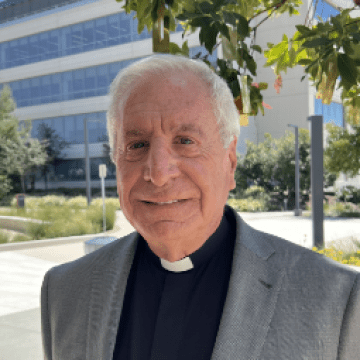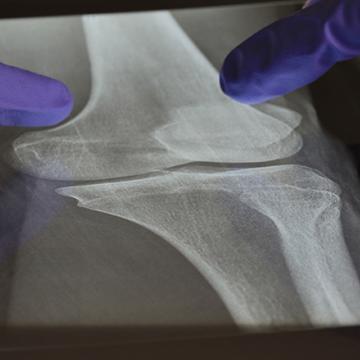Practical Concerns: Managing Work, School and Home
"It was very hard for a hands-on dad to just suddenly not be there."
- Ian MacLeod, acute myeloid leukemia survivor

Ian MacLeod was 34 years old when he was diagnosed with acute myeloid leukemia. From the moment of diagnosis, he experienced several bouts of fear — from whether he would find a match for a lifesaving bone marrow transplant, to whether he would be alive to walk his daughter down the aisle during her wedding.
Yet other practical concerns, some of which seem like lesser ones now that he is in remission, also nagged MacLeod during treatment. Being in the hospital so much, especially while undergoing his transplant, he felt at both a physical and emotional distance from his family. And he felt intense guilt about not being around for his wife, his 4-year-old daughter and his 2-year-old son.
“It was really, really hard on me,” said MacLeod. “Very hard for a hands-on dad to just suddenly not be there.”
It was not until several months into remission — after getting counseling and experiencing a major shift in his spiritual life — that MacLeod began to shed those guilty feelings and enjoy his family again.
“Every day now I wake up and when my eyes open and my kids jump into bed, I’m completely surprised that I’m still here,” says Ian. “I wake up and I’m just blown away. I’m just so excited to get into the day.”
Yet other practical concerns, some of which seem like lesser ones now that he is in remission, also nagged MacLeod during treatment. Being in the hospital so much, especially while undergoing his transplant, he felt at both a physical and emotional distance from his family. And he felt intense guilt about not being around for his wife, his 4-year-old daughter and his 2-year-old son.
“It was really, really hard on me,” said MacLeod. “Very hard for a hands-on dad to just suddenly not be there.”
It was not until several months into remission — after getting counseling and experiencing a major shift in his spiritual life — that MacLeod began to shed those guilty feelings and enjoy his family again.
“Every day now I wake up and when my eyes open and my kids jump into bed, I’m completely surprised that I’m still here,” says Ian. “I wake up and I’m just blown away. I’m just so excited to get into the day.”
Finding Balance Can Be Difficult
Balancing your home, work or school life can be exceedingly difficult both during and after cancer treatment. You may feel estranged from your family. You may need to reduce your work hours — or you might have a hard time working at all — to accommodate treatment. As a student, you may have to reduce your class load, or not participate at all in school social activities.
And your usual relationships with family members, friends, classmates or co-workers will very likely change as you go through your cancer journey.
These are all very common developments for cancer patients. Talking to a City of Hope clinical social worker can help you cope with them, and there are actions you can take on your own to manage the impact on your routines and relationships.
And your usual relationships with family members, friends, classmates or co-workers will very likely change as you go through your cancer journey.
These are all very common developments for cancer patients. Talking to a City of Hope clinical social worker can help you cope with them, and there are actions you can take on your own to manage the impact on your routines and relationships.
Ways to Improve Your Home Life
- Ask for help when needed.
- Talk to your family about what you are still able to do and what you can no longer do.
- Give yourself time.
- Openly discuss any changes cancer brings.
- Be aware that recovery may take longer than expected.
- If you have children:
- Be honest with them.
- Speak directly and openly.
- Spend quality time with them.
- Allow them to become informed about your cancer and involved in your recovery.
- Ask your doctor about child life services. A child life specialist can speak with your children about your cancer and help them adjust.
- Talk to your care team about any additional services you may need.
Working While in Treatment
- Talk to your employer about making schedule or workplace adjustments.
- Ask your employer about working at home or using special equipment to make it easier for you to do your job.
- Document each request and outcome.
- Talk to your doctor or nurse about scheduling follow-up visits that do not conflict with your work responsibilities.
- Get your doctor to write a letter to your employer about how cancer may affect your work or work schedule.
Addressing Concerns About School
- Let your school advisor know about your progress.
- Find out about school resources to make it easier for you to return to school. These may include:
- Student health services
- Financial aid resources
- Career planning services
- Student health insurance
- Ask friends to keep you updated about any changes at school.
- Talk to your instructor about getting additional time to complete assignments or about getting copies of lecture notes.
- You may choose to take some time off school.
This information was summarized or adapted from: National Cancer Institute. Facing Forward: Life After Cancer Treatment-social and work relationships. 2010. NIH Publication No. 10-2424.
More Helpful Resources
- American Cancer Society
- National Cancer Institute
- Child Life Services for Children of Adult Patients
- School Program at City of Hope - This program help young patients to continue life through socialization and continued academic progress during treatment and recovery.
Adolescents and Young Adults
At City of Hope, we know that adolescents and young adults (AYAs) ages 15 to 39 have unique needs. That's why we offer medical care, psychosocial support and resources designed to help AYAs flourish from diagnosis to treatment and beyond.
Interventions for younger children and older adults are not always appropriate for adolescents and young adults. We offer AYA-specific medical care that is designed to treat cancer aggressively while minimizing the long-term effects.

